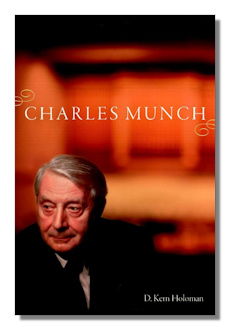
The Internet's Premier Classical Music Source
Related Links
-
Introduction
Acoustics
Ballet
Biographies
Chamber Music
Composers & Composition
Conducting
Criticism & Commentary
Discographies & CD Guides
Fiction
History
Humor
Illustrations & Photos
Instrumental
Lieder
Music Appreciation
Music Education
Music Industry
Music and the Mind
Opera
Orchestration
Reference Works
Scores
Thematic Indices
Theory & Analysis
Vocal Technique
Search Amazon
Recommended Links
Site News
 Book Review
Book Review
Charles Munch

D. Kern Holoman
Oxford, New York: Oxford University Press, 2012. xxxi, 296 pages
ISBN-10: 0199772703
ISBN-13: 978-0199772704
Acid-free paper
Online Appendix (password required): Charles Munch, The Recorded Legacy. 97 pages
Online Discography
Charles Munch (1891-1968) was one of the great conductors and left a significant recorded legacy. Best known for his thirteen seasons as Music Director of the Boston Symphony Orchestra (1949-1962), Munch's earlier and later work in Paris, and his several international tours, were also important. Holoman's biography is admirably well-researched and documented.
Particularly remembered for his interpretations of French orchestral music, from Berlioz to Dutilleux, Munch also played a great deal of Bach and, in the 1930's, when new works were expected by the public, helped the French recognize the appeal of Brahms. New works were regularly scheduled, in Paris and later in Boston, where they were even more generally accepted. He also performed the music of Martinu, Tcherepnin, Easley Blackwood, Walter Piston, Alexei Haieff and Leo Smit, some of whom are hardly known today but who were representative of the music of his time. For some readers, his repertoire will be a chief point of interest in this book. Of Piston, Munch said, "Everything Piston does is perfectly organized; nothing is left to chance. It is all logical, as music should be."
As a conductor, Munch respected his players and was loved by them – in the way Giulini was. As a human being, Munch was kind and determined to spread joy in music-making. He corrected mistakes gently and his smile of approval or encouragement could lead to maximum exertions from players. From Holoman's account it seems that he was given more rehearsal time than more recent conductors, but he was far more interested in spontaneous and seemingly inspired performances than in carefully prepared interpretations. His performances of the same works might be quite different, even on consecutive evenings. At his best, his performances were electrifying and much appreciated by audiences.
As a music director in Boston, Munch was responsible for all programming and for auditioning new players. The latter was not something he enjoyed; he enjoyed firing players even less and he did not do it. What he did do was hire the first woman to play in the BSO, Doriot Anthony Dwyer, who was a very fine first flute for many years, as well as the first Black player. Generally, auditions were blind in the early stages. At the end of his career, Munch was the founding Music Director of the Orchestre de Paris and for that he auditioned three hundred players. Holoman gives a delightful account of the audition in New York of a clarinet player who, asked what he had prepared for the audition, responded by asking, "What would you like to hear?" After playing the Mozart Clarinet Concerto, the candidate said, "Pretty good, huh?" Munch hired him on the spot.
Although committed to spreading joy, in private Munch reportedly seemed sad. He was not gregarious. On the other hand, he was known to have quite a few close women friends, at least one of whom, a pianist with whom he performed internationally, was a life-long protégé,. Whether from general discretion or otherwise, these close associations never caused any public scandal, judging from Holoman's account. Munch's marriage was highly unusual, intended from the beginning as a companionate "mariage blanc" with a cultivated and wealthy but physically disabled woman who loved him and whom his mother urged him to marry; they wed in 1933 and she died in 1956. After only one year with Charles in Boston, she returned to France for the remainder of her life.
The more background the reader can bring to this book the more it can be appreciated. A few criticisms I have of Holoman's writing relate to the likelihood that musically informed readers may not be equally familiar with some relevant events in European history. It might have helped had Munch's combined French and German cultural heritage been explained in part by the fact that Strasbourg, where he grew up, had been taken from France in1870 after the Franco-Prussian war, just two decades before Munch's birth, accounting for his service in the German army in the First World War, and restored to France right after that war. Also, a fuller account of the German occupation of northern France after 1940 and its split from the despised Vichy regime in the south, would have clarified the animosity between Munch and Paray, and the opprobrium which attached to the great pianist Cortot, which is alluded to but not explained well – especially on first mention – by Holomon. Other minor omissions, such as an explanation of Joseph Silverstein's unexplained but "obvious" loyalty to Leinsdorf, Munch's successor in Boston, would have been clear if it had simply been mentioned that Silverstein became concertmaster there at the time of that succession. And non-French readers will have to guess that a 1r prix is presumably a first (premier) prize. But these are minor defects in a generally very fine book.
Copyright © 2012, R. James Tobin



















